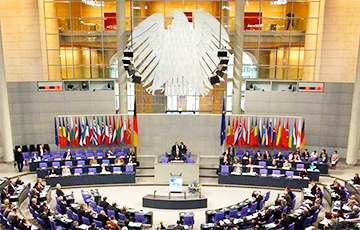German Bundestag Factions Discuss Action After Merz's Non-election
6- 6.05.2025, 14:41
- 8,688

The Conservative leader could be voted against by some of his associates.
After the unexpected outcome of the Bundestag vote, which was considered only a formal procedure in the process of electing a new German chancellor, parliamentary factions are conferring on further actions. According to media reports, the political forces that formed the ruling coalition are blaming their partners for the failure to elect conservative leader Friedrich Merz as head of the German government in the first round of voting on Tuesday, May 6, "Deutsche Welle".
The SPD denies blame for the failure of the vote
The Social Democratic Party of Germany (SPD) faction does not believe the Social Democrats are responsible for Merz's failure. "We assume that there was full approval on our side. Besides, no one was absent," a source close to SPD faction head Lars Klingbeil (Lars Klingbeil) told Reuters. Another Social Democrat interlocutor speaking to Reuters suggested that some of his associates may have voted against Merz because of disagreements within the faction.
In the meantime, the conservative bloc of the Christian Democratic Union (CDU) and the Christian Social Union (CSU) accused the Social Democrats of sabotage, Bild wrote. CDU General Secretary Carsten Linnemann (Carsten Linnemann) called for a decision on the way forward as soon as possible. "Europe needs a strong Germany. Why we cannot wait a few days," Linnemann told the Bundestag. He emphasized that the red-black coalition is aware of its responsibility in this regard. Further action is being scrutinized because of the lack of precedent, he added.
Conservatives call for prudence
Christian Democrat Johann Wadephul (Johann Wadephul), who is expected to take over as foreign minister in the new cabinet, called for a new round of voting on Wednesday, May 7. He said the failure in the first vote was "regrettable" but was not a "dramatic event."
For his part, CSU chairman Markus Söder (Markus Söder) urged lawmakers to "remain prudent and calm." It is still possible to put things right, he emphasized, delivering an emergency statement in Munich after a cabinet meeting. He called on "all democrats" to make it possible to create a "stable government" and become an example of a working democracy. Now is not the right time to settle old scores and make sarcastic comments, the Bavarian conservative leader said.
Consultations on the date of the new vote
As Reuters notes, the leaders of the CDU/CSU, SPD, Greens and Left Party factions are currently consulting on the possibility of holding a new vote as soon as possible, on May 7 rather than May 9. Friedrich Merz is determined to stand for election again and has received full support in his faction, the agency further writes with reference to a source in the Bundestag.
Friedrich Merz himself, according to "Bild in Russian," wants to hold a second round of voting as early as Tuesday. In conversations within the faction, he expresses optimism and believes that some parliamentarians (we are talking about 18 members of the CDU/CSU and/or SPD) voted "against" not seriously, but rather out of sentiment. The Bundestag administration, lawyers and other factions must find a way to hold the May 6 runoff. The CDU, the Left Party and the Alternative for Germany (AdG) have already agreed to a second vote.
Merz did not receive the necessary absolute majority of votes
Which of the ruling coalition's detupats voted against Merz's election is unknown, as the vote was secret. On the morning of May 6, the CDU chairman failed to get an absolute majority of votes in the Bundestag: with the minimum required 316, he won only 310. This is the first such case in the history of the FRG.
Another 307 deputies spoke out against the candidacy of Merz, three abstained, one vote was recognized as invalid. A total of 621 out of 630 parliamentarians voted. The CDU/CSU and SPD bloc, which formed the government coalition, have a total of 328 mandates in the current Bundestag convocation.
After the failed election of the chancellor, the Bundestag session was suspended for consultations between parliamentary factions. A re-vote must take place "within fourteen days," as prescribed by Article 63 of Germany's Basic Law. If in this case Merz does not receive the necessary 316 votes out of 630, a simple majority will be sufficient for him to be elected head of government on the third attempt.











